[Video] Inside dog farm in Korea
Humane Society International rescues 200 dogs in South Chungcheong Province
By Park Ju-youngPublished : Feb. 20, 2019 - 14:57
HONGSEONG, South Chungcheong Province -- On a rainy Friday morning, howls filled the cold, foggy air around a recently decommissioned dog farm in a remote corner of South Chungcheong Province. Here some 200 dogs had been confined in filthy cages with inadequate food, water and care.
Friday was the third day of Humane Society International’s dog rescue project, which kicked off on Feb. 13 as part of the organization’s efforts to save dogs from Korea’s puppy mill trade and dog meat industry. The global animal protection organization dispatched five veteran staff members in the project’s first week to rescue every dog from the farm.
Friday was the third day of Humane Society International’s dog rescue project, which kicked off on Feb. 13 as part of the organization’s efforts to save dogs from Korea’s puppy mill trade and dog meat industry. The global animal protection organization dispatched five veteran staff members in the project’s first week to rescue every dog from the farm.
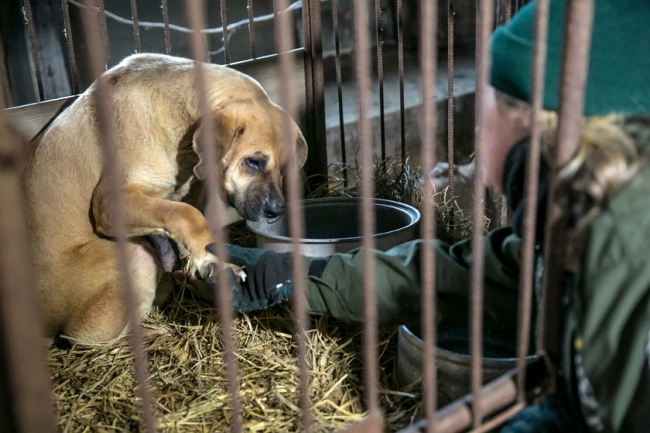
“Today we are here to move the dogs out from the farm and send them to Canada and the US for adoption,” said Adam Parascandola, a senior director from HSI’s animal protection and crisis response team.
“We already removed some 40 dogs over the last two days, and will remove 38 more today.”
Plastic crates were piled on the ground, waiting to transport the rescued dogs and puppies to Incheon Airport.

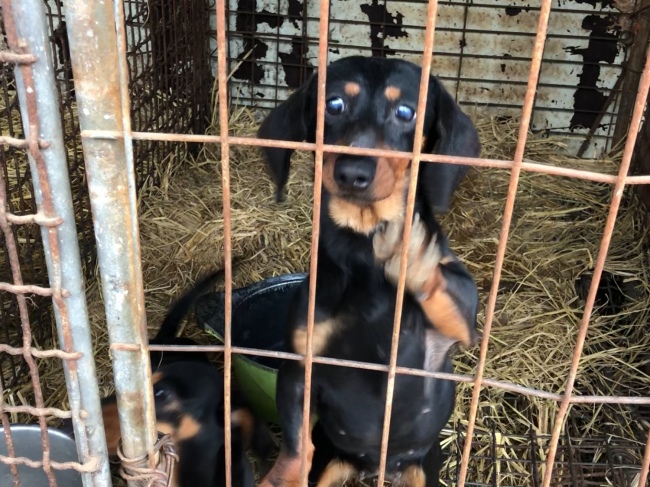
When staff approached the cages, barking built to a crescendo as the canines desperately seemed to call for help. A tiny golden brown poodle could barely be heard, hoarse from woofing too much.
The staff entered the cages and carefully brought the dogs out one by one. As the operation proceeded, more dogs jumped and barked in agitation to escape.
The farm had been divided into two parts, with some cages located in a wide open space outside and other cages inside a makeshift building. Pregnant dogs and newborn puppies stayed in heated cages. Most of the dogs, however, were confined to cramped cages exposed to the subzero temperatures of Korea’s harsh winter.
Before the rescue staff put down straw in the cages, dogs were forced to wrap their paws uncomfortably around the steel piping of the cages, which were suspended about 50 centimeters above ground.
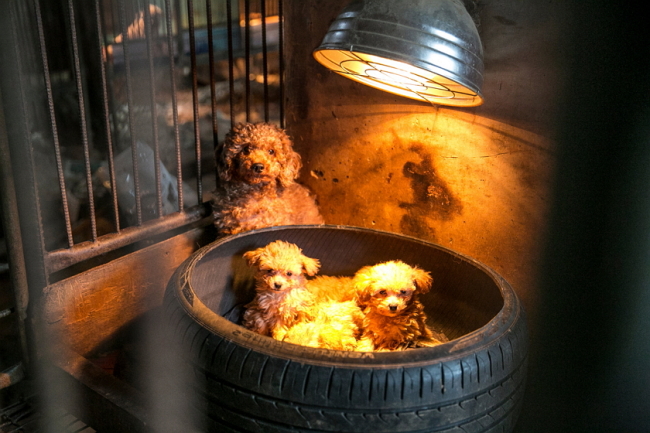
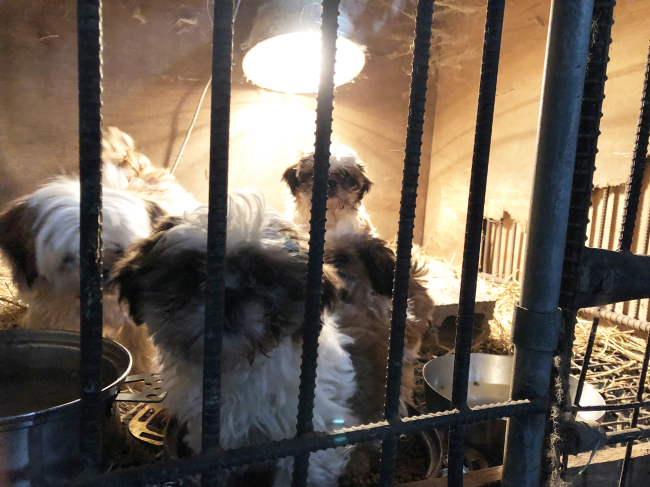
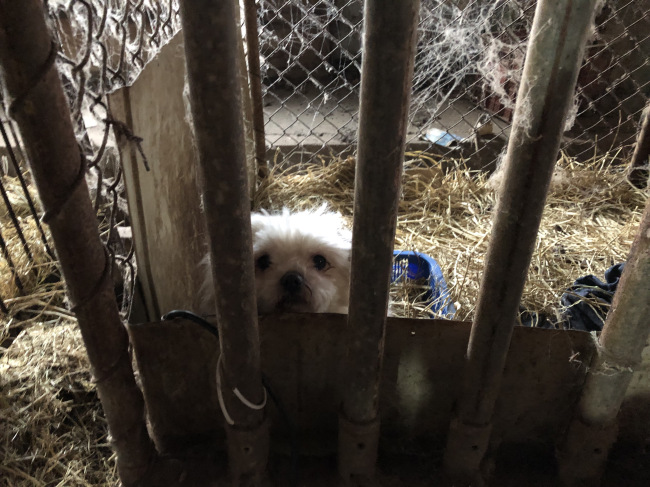
“When we first came here, the dogs and puppies were eating meals made out of food garbage and the leftovers from chicken processing factories,” Kim Na-ra from HSI told The Korea Herald.
“At least, the owner here seemed to have cleaned up the feces frequently. In some dog meat farms, feces pile up and rot under the cage for years.”
The breeds on the farm varied from toy dogs, including Chihuahuas, corgis, Yorkshire terriers, poodles, Pomeranians, shih tzus and French bulldogs, to bigger breeds such as huskies and Jindos, which are indigenous to Korea, as the owner bred all kinds of dogs for both the pet trade and slaughter.
“I started the dog meat farm with four dogs eight years ago,” the 60-year-old farm owner, surnamed Lee, told The Korea Herald.
“The business became increasingly unprofitable as years passed, since many people in Korea don’t eat dogs anymore.”
He said he was looking to exit the trade because business was slow and his family had also put pressure on him to find a better paying occupation.
HSI gave Lee compensation for the closure of the farm and to support retraining. Lee will begin a computer competence course and said he hopes to become a security guard.
As Lee said, the popularity of dog meat has slowly decreased here as public sentiment toward eating dog meat has grown more negative.
According to the latest survey conducted by Gallup Korea in 2018, about 60 percent of 1,006 respondents felt negative about dog meat consumption, while 74.8 percent said they would not eat dog meat in the future.
Last year, more than 214,000 people signed a petition calling for the prohibition of the slaughter of dogs on Cheong Wa Dae’s official online petition platform. There were also three similar petitions registered on the platform that garnered over 200,000 signatures that same year.
“I earned at least 200,000 won ($178) if I sold a 30-kilogram dog in the past, but they now cost less than 100,000 won. More than half of dog meat farms in Hongseong have shut down due to financial difficulties,” Lee said.
Lee reduced the number of dogs raised for slaughter from 70 to 20. Instead, he started a puppy mill business by buying small dogs at auction.
“I had bought 1- to 3-year-old dogs from the dog auctions. The female dogs gave birth twice a year, and the puppies were brought to auctions for sale 30 days after they were born. If the mother dogs became over 5 years old, I sold them via auctions for people who needed them,” Lee said.
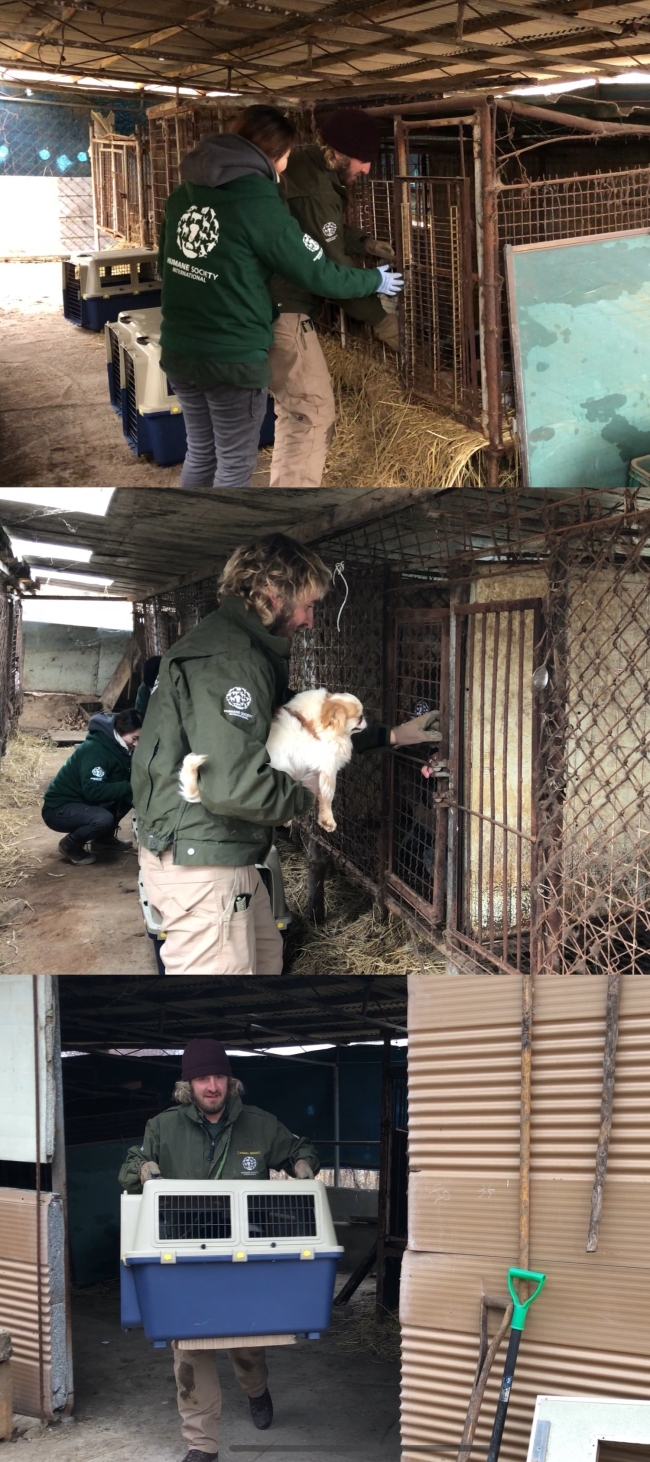
Under Korean law, the operations of puppy mills and dog auctions require permission from the government. As of Tuesday, 1,130 puppy mills and 17 auctions are officially registered on the approved list, according to the Ministry of Agriculture, Food and Rural Affairs.
Local animal activists groups, however, estimate there are over 3,000 puppy mills and 20 auctions in operation in Korea.
“It’s difficult to find and regulate all illegal puppy mills here, as those are hidden all across the country. Some puppy mill owners breed dogs in their private houses, which is extremely hard to track down,” Song Ji-sung, an animal activist from the Korean Animal Welfare Association, told The Korea Herald.
“As illegal routes of selling and trading puppies have increased especially via online platforms, the number of illegal puppy mills has become greater as well. The puppy mills that produce so many puppies can easily lead to animal abuse as the owners often can’t offer proper conditions for the dogs to breed.”
Lee in Hongseong was one of many owners who could no longer manage his farm properly. As profit plummeted and his health deteriorated, he decided in November to shut down the farm and hand over the dogs to HSI.
“The line between puppy mills and dog meat farms is routinely blurred in Korea, and with our dog farm closure we are exposing the shocking reality of that,” HSI activist Kim Na-ra said.
“They all start life in this depressing, squalid place, with only a lucky few ending up as a beloved companion, while their cage mates are served at a restaurant or enter a chain of auctions where they are sold on to the next farmer to produce litter after litter of puppies.”
Local animal activists groups, however, estimate there are over 3,000 puppy mills and 20 auctions in operation in Korea.
“It’s difficult to find and regulate all illegal puppy mills here, as those are hidden all across the country. Some puppy mill owners breed dogs in their private houses, which is extremely hard to track down,” Song Ji-sung, an animal activist from the Korean Animal Welfare Association, told The Korea Herald.
“As illegal routes of selling and trading puppies have increased especially via online platforms, the number of illegal puppy mills has become greater as well. The puppy mills that produce so many puppies can easily lead to animal abuse as the owners often can’t offer proper conditions for the dogs to breed.”
Lee in Hongseong was one of many owners who could no longer manage his farm properly. As profit plummeted and his health deteriorated, he decided in November to shut down the farm and hand over the dogs to HSI.
“The line between puppy mills and dog meat farms is routinely blurred in Korea, and with our dog farm closure we are exposing the shocking reality of that,” HSI activist Kim Na-ra said.
“They all start life in this depressing, squalid place, with only a lucky few ending up as a beloved companion, while their cage mates are served at a restaurant or enter a chain of auctions where they are sold on to the next farmer to produce litter after litter of puppies.”
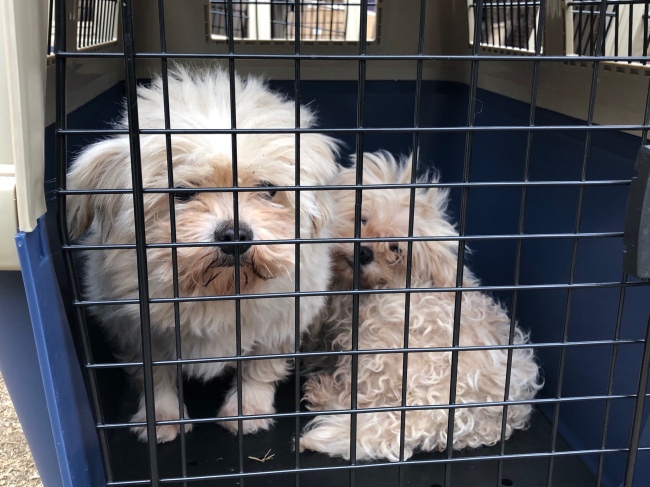
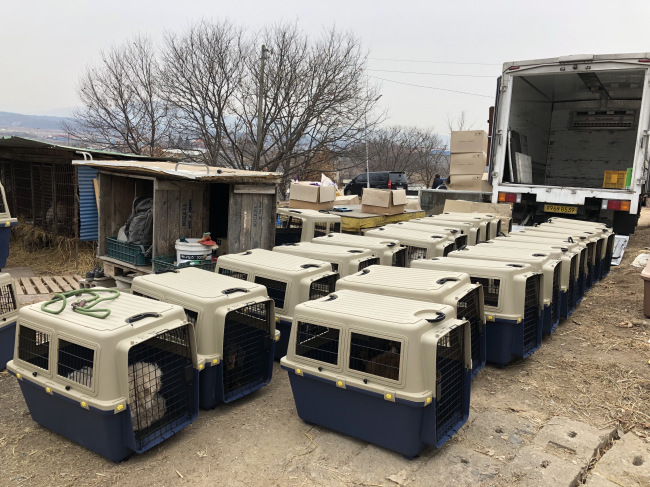
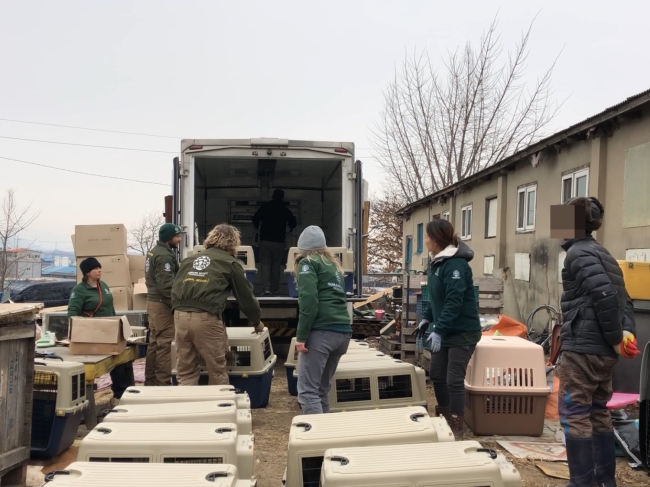
When the staff finished placing the rescued dogs in the new crates, they were loaded on a truck headed to Incheon Airport. The dogs are set to stay in temporary shelters in the US and Canada until they find new families.
A new English name for each dog is written on the crates -- from Lily to Patrick.
“It is an immense relief to be able to rescue them and fly them to North America where we can work with partner organizations and begin the search for adoptive families. For them, the nightmare is over, and we hope that by exposing their suffering we can hasten the end of the entire industry for good,” Kim said.
By Park Ju-young (jupark@heraldcorp.com)








![[KH Explains] How should Korea adjust its trade defenses against Chinese EVs?](http://res.heraldm.com/phpwas/restmb_idxmake.php?idx=644&simg=/content/image/2024/04/15/20240415050562_0.jpg&u=20240415144419)










![[Today’s K-pop] Stray Kids to return soon: report](http://res.heraldm.com/phpwas/restmb_idxmake.php?idx=642&simg=/content/image/2024/04/16/20240416050713_0.jpg&u=)